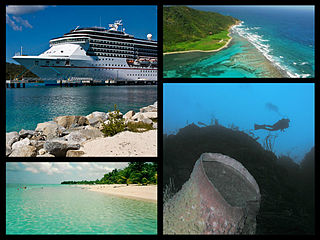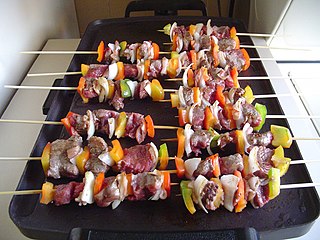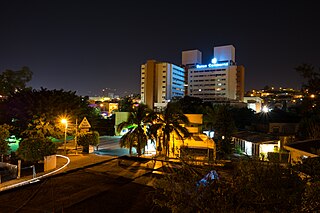 |
|---|
Presidential elections were held in Honduras in 1881. The result was a victory for the Liberal candidate, [1] incumbent President Marco Aurelio Soto, who received 82% of the vote.
 |
|---|
Presidential elections were held in Honduras in 1881. The result was a victory for the Liberal candidate, [1] incumbent President Marco Aurelio Soto, who received 82% of the vote.
| Candidate | Party | Votes | % | |
|---|---|---|---|---|
| Marco Aurelio Soto | Liberal | 24,521 | 82.30 | |
| Other candidates | 5,274 | 17.70 | ||
| Total | 29,795 | 100.00 | ||
| Source: Euraque | ||||

Central America is a subregion of the Americas. Its political boundaries are defined as bordering Mexico to the north, Colombia to the south, the Caribbean Sea to the east, and the Pacific Ocean to the west. Central America usually consists of seven countries: Belize, Costa Rica, El Salvador, Guatemala, Honduras, Nicaragua, and Panama. Within Central America is the Mesoamerican biodiversity hotspot, which extends from northern Guatemala to central Panama. Due to the presence of several active geologic faults and the Central America Volcanic Arc, there is a high amount of seismic activity in the region, such as volcanic eruptions and earthquakes which has resulted in death, injury, and property damage.

Honduras, officially the Republic of Honduras, is a country in Central America. The republic of Honduras is bordered to the west by Guatemala, to the southwest by El Salvador, to the southeast by Nicaragua, to the south by the Pacific Ocean at the Gulf of Fonseca, and to the north by the Gulf of Honduras, a large inlet of the Caribbean Sea. Its capital and largest city is Tegucigalpa.

Honduras was inhabited by many indigenous peoples when the Spanish arrived in the 16th century. The western-central part of Honduras was inhabited by the Lencas, the central north coast by the Tol, the area east and west of Trujillo by the Pech, the Maya and Sumo. These autonomous groups maintained commercial relationships with each other and with other populations as distant as Panama and Mexico. Honduras has ruins of several cities dating from the Mesoamerican pre-classic period that show the pre-Columbian past of the country.

The economy of Honduras is based mostly on agriculture, which accounts for 14% of its gross domestic product (GDP) in 2013. The country's leading export is coffee (US$340 million), which accounted for 22% of the total Honduran export revenues. Bananas, formerly the country's second-largest export until being virtually wiped out by 1998's Hurricane Mitch, recovered in 2000 to 57% of pre-Mitch levels. Cultivated shrimp is another important export sector. Since the late 1970s, towns in the north began industrial production through maquiladoras, especially in San Pedro Sula and Puerto Cortés.
The Football War, also known as the Hundred Hours' War or 100 Hour War, was a brief military conflict fought between El Salvador and Honduras in 1969. Existing tensions between the two countries coincided with rioting during a 1970 FIFA World Cup qualifier. The war began on 14 July 1969 when the Salvadoran military launched an attack against Honduras. The Organization of American States (OAS) negotiated a cease-fire on the night of 18 July, which took full effect on 20 July. Salvadoran troops were withdrawn in early August. The war had major consequences for both countries and was a major factor in starting the Salvadoran Civil War a decade later.

Honduras is divided into 18 departments. Each department is headed by a governor, who is appointed by the President of Honduras. The governor represents the executive branch in the region in addition to acting as intermediary between municipalities and various national authorities; resolves issues arising between municipalities; oversees the penitentiaries and prisons in his department; and regularly works with the various Secretaries of State that form the President's Cabinet. To be eligible for appointment as a governor, the individual must: a) live for five consecutive years in the department; b) be Honduran; c) be older than 18 years of age and; d) know how to read and write.

The Bay Islands is a group of islands off the coast of Honduras. Collectively, the islands form one of the 18 departments of Honduras. The departmental capital is Coxen Hole, on the island of Roatán.

The Honduras national football team represents Honduras in men's international football. The team is governed by the Federación Nacional Autónoma de Fútbol de Honduras. They are nicknamed Los Catrachos, La Bicolor, or La H.

The National Autonomous Federation of Football of Honduras, known as FENAFUTH, is the official football governing body in Honduras and is in charge of the Honduras national team. FENAFUTH was founded in 1951 and joined FIFA the same year. It joined CONCACAF in 1961.

José Manuel Zelaya Rosales is a Honduran politician who was President of Honduras from 27 January 2006 until his forcible removal in the 2009 coup d'état, and who since January 2022 serves as the first First Gentleman of Honduras. He is the eldest son of a wealthy businessman, and inherited his father's nickname "Mel". Before entering politics he was involved in his family's logging and timber businesses.

Liga Betcris de Honduras is the highest division of football in Honduras. The league season is divided into Opening (autumn) and Closing (spring). One team is relegated to the Liga de Ascenso and one team is promoted from Liga de Ascenso. The top four clubs participate in play-offs to decide the champion. The winners of the Opening and Closing competitions participate in the CONCACAF Champions Cup.

Iris Xiomara Castro Sarmiento, also known as Xiomara Castro de Zelaya, is a Honduran politician and business woman, who is the 56th president of Honduras, in office since January 2022. She is the country's first female president, having earlier served as first lady during the presidency of her husband Manuel Zelaya.

Honduran cuisine is a fusion of Mesoamerican, Spanish, Caribbean and African cuisines. There are also dishes from the Garifuna people. Coconut and coconut milk are featured in both sweet and savory dishes. Regional specialties include sopa de caracol, fried fish, tamales, carne asada and baleadas. Other popular dishes include meat roasted with chismol and carne asada, chicken with rice and corn, and fried fish with pickled onions and jalapeños. In the coastal areas and the Bay Islands, seafood and some meats are prepared in many ways, including with coconut milk. Among the soups the Hondurans enjoy are bean soup, mondongo soup, seafood soups and beef soups. Generally all of these soups are mixed with plantains, yuca, and cabbage, and served with corn tortillas.
Honduran Americans are Americans of full or partial Honduran descent. Hondurans are the eighth largest Latino group in the United States and the third largest Central American population, after Salvadorans and Guatemalans. Hondurans are concentrated in Texas, Florida and California.

In political science, the term banana republic describes a politically and economically unstable country with an economy dependent upon the export of natural resources. In 1904, the American author O. Henry coined the term to describe Honduras and Costa Rica under economic exploitation by U.S. corporations, such as the United Fruit Company. Typically, a banana republic has a society of extremely stratified social classes, usually a large impoverished working class and a ruling class plutocracy, composed of the business, political, and military elites. The ruling class controls the primary sector of the economy by way of the exploitation of labor; thus, the term banana republic is a pejorative descriptor for a servile oligarchy that abets and supports, for kickbacks, the exploitation of large-scale plantation agriculture, especially banana cultivation.

The president of Honduras officially known as the President of the Republic of Honduras, is the head of state and head of government of Honduras, and the Commander-in-chief of the Armed Forces. According to the 1982 Constitution of Honduras, the Government of Honduras consists of three branches: Executive, Legislative and Judicial. The president is the head of the Executive branch, their primary duty being to "Execute and enforce the Constitution, treaties and conventions, laws and other legal dispositions." The President is directly elected for a four year term.

The 2009 Honduran coup d'état, which took place during the 2009 Honduran constitutional crisis, occurred when the Honduran Army, following orders from the Honduran Supreme Court, ousted President Manuel Zelaya on 28 June 2009 and sent him into exile. Zelaya had attempted to schedule a non-binding poll to hold a referendum on convening a constituent assembly for writing a new constitution. Despite court orders to cease, Zelaya refused to comply, and the Honduran Supreme Court issued a secret arrest warrant dated 26 June. Two days later, Honduran soldiers stormed the president's house in the middle of the night, detained him, and thwarted the poll. Instead of putting him on trial, the army put him on a military plane and flew him to Costa Rica. Later that day, after reading a resignation letter of disputed authenticity, the Honduran Congress voted to remove Zelaya from office and appointed Head of Congress Roberto Micheletti, his constitutional successor, to complete his term. This was the first coup to occur in the country since 1978.

Tegucigalpa —formally Tegucigalpa, Municipality of the Central District, and colloquially referred to as Tegus or Teguz—is the capital and largest city of Honduras along with its sister city, Comayagüela.
The Miss Honduras or Miss Honduras Universe is a national beauty pageant in Honduras. The pageant was founded in 1930, where the winners were sent to Miss Universe.

Gender inequality in Honduras has seen improvements in some areas regarding gender inequality, while others have regressed towards further inequality since in 1980s. Comparing numbers from the 2011 and 2019 United Nations Human Development Reports helps to understand how gender inequality has been trending in Honduras. In the 2011 Human Development Report rankings for the Gender Inequality Index, Honduras ranked 121st out of 187 countries. In the 2019 Human Development Report Honduras dropped to 132nd out of 189 countries in the rankings. As the country's overall ranking dropped, it indicates that progress towards gender equality is not being made on the same level as other countries around the world.